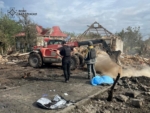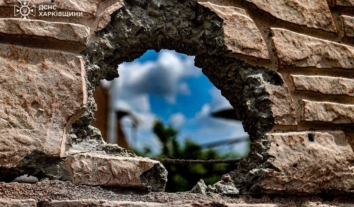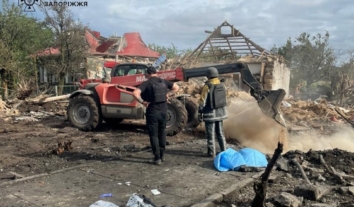Russians hit Zaporizhzhia Oblast with guided aerial bombs, killing and injuring people
Ivan Fedorov, Head of the Zaporizhzhia Oblast Military Administration, reported that Russians attacked the Polohy district in the Zaporizhzhia Oblast with guided aerial bombs, killing one person and injuring another.
“The enemy attacked the village of Verkhna Tersa with guided aerial bombs at dawn. At least five bombs were dropped on houses. Residential buildings have been destroyed and damaged. People are trapped under the rubble,” Fedorov wrote.
Ukraine’s President Volodymyr Zelenskyy said on May 28 that Defence Minister Rustem Umierov contacted Russia’s representative, Vladimir Medinsky, following the major prisoner exchange agreed upon during negotiations in Istanbul. However, Ukraine has still not received the “memorandum” promised by Russia.
“We genuinely expected them to present their ‘agenda’ – a ceasefire, followed by a plan for a leaders’ meeting. We were expecting this even before the exchange. We were then told the agenda or memorandum would be provided immediately after the exchange. However, we have received nothing. Our side contacted the Russians – Defence Minister Umierov called Mr Medinsky. They assured us: ‘It will come, it will come’. But we have not received anything. No one has. We’ve approached the United States – they are also waiting. Everyone is waiting. We should probably stop waiting and move on to more decisive steps,” the President of Ukraine said.
He also reported that Russian forces are continuing their offensive operations along the front lines and are currently amassing more than 50,000 troops on the Sumy front.
Zelenskiy also called on Western allies to provide about $30 billion by the end of the year to boost domestic weapons production and hold off Russia’s advance.
With support from the US under President Donald Trump waning and efforts at peace negotiations with Russia’s Vladimir Putin stalling, Ukraine is increasingly focused on relying on its own resources. But the war-battered economy is far short on investments needed to ramp up arms production, Zelenskiy said.
Ukraine urges the international community to unite to restore global security under the UN Charter and strengthen sanctions against Russia to enforce compliance with international law. Following Russia’s initial invasion in 2014, Ukraine has pursued the liberation of its territories within its internationally recognised 1991 borders while developing comprehensive reintegration strategies and policies for all liberated areas.
Previously, Bohdan Bernatskyy, a member of the Sanctions Policy Working Group of the Crimean Platform Expert Network, revealed at the Third Parliamentary Summit in Latvia that over 1,300 Russian military companies and 2 million industrial workers continue to operate, many without international restrictions.
Meanwhile, India remains one of the main consumers of Russian oil and continues to fill the defence budget of the aggressor state since EU sanctions were imposed.
According to enkorr, citing tanker tracking data, in April, Russian oil’s share of India’s imports rose to 38%, up from 32% in March 2025.
India’s total oil import volume also increased by 1.9%, to 5.4 million barrels per day (bpd). Meanwhile, supplies from Middle Eastern countries decreased: from 46% in March to 37% in April.
ZMINA has sent an information request to the Ministry of External Affairs of India regarding sanctions against the aggressor state.
Investigative journalists of the Belarusian Investigative Centre have previously found a Belarusian company that organises the delivery of such items despite the EU ban on importing luxury goods worth more than €300 to Russia. The company in question is Belcargo, which is linked to a former aide of the Belarusian president’s son.
One of the investigators, posing as a client, contacted the company and attempted to place an order to send a shipment of jackets from Italy to Russia. In response, they proposed a simple scheme: purchase the items, send them to Lithuania, and from there, they would deliver them to Russia via Belarus.
The order involved ten luxury jackets with a market value of €6,450, but in the order, the investigators declared a fictitious value of €1,730. “Belcargo” did not pay attention to this and issued an invoice for $255 for delivery, including customs clearance.
A connecting link in this scheme is the Belarusian company “Torgovy dom Exporttorg.” In one of the Lithuanian export documents, it is listed as the recipient of a clothing shipment from Italy, while in Russian customs declarations, it is listed as the sender.
Despite all this, the company is still not under sanctions by either the European Union or the USA. This allows it to use international logistics and banking services.

















